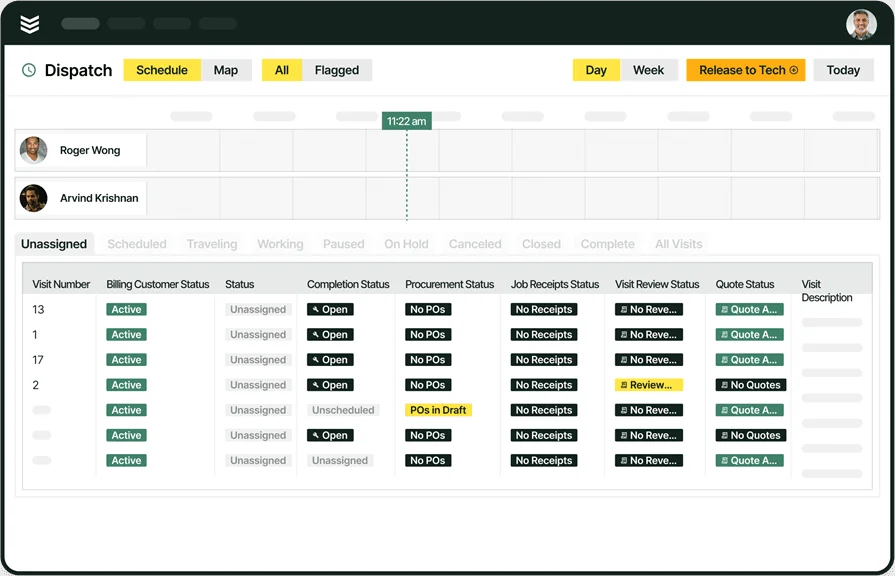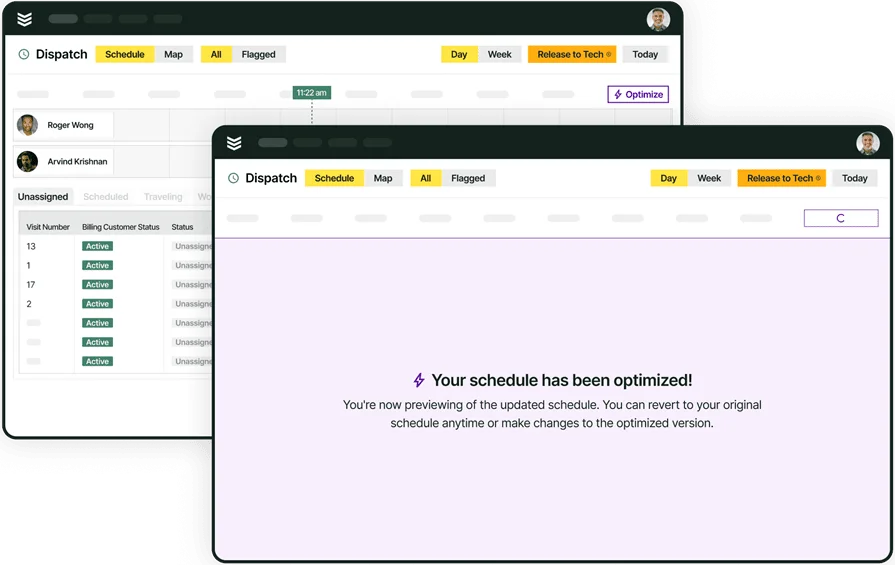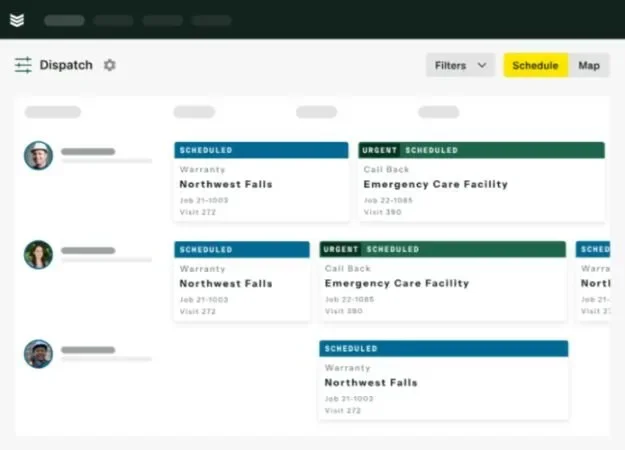The electrical industry powers everything from residential neighborhoods to major industrial complexes. Meeting demand today means keeping pace with fast-moving jobs, tight project schedules, and customers who expect immediate answers. Behind every successful electrical business is a smooth dispatching system.
Keeping your techs moving, your customers updated, and your operations on track requires more than just a whiteboard and a phone call. That’s where electrical dispatch software steps in—giving you the tools to handle scheduling chaos, get real-time updates from the field, and make smarter decisions on the fly. Good software doesn't just help you manage dispatch—it helps you protect profits and build stronger customer relationships. To help you choose the best fit for your crew, here’s what we’ll cover:
- Choosing the right electrical dispatch software for your team
- 5 key features to look for in an electrical contractor dispatch software
- 6 best electrical contractor dispatch software to optimize field work
- 7 benefits of using electrical dispatch software
- 5 common electrical dispatch software FAQs answered
Running dispatch the old way leaves room for mistakes, miscommunications, and missed opportunities. Before we jump into features and top picks, let’s talk about what to focus on when picking electrical dispatch software that actually fits how your business runs day to day.
Choosing the right electrical dispatch software for your team
Managing dispatch in the electrical industry means staying on top of urgent service calls, shifting project schedules, jobsite hazards, and constant customer communication. Picking electrical dispatch software should line up with the real-world pressure electricians face every day.
Before making a decision, here are five key areas to think through:
- Workload management – How often are technicians overloaded or underbooked? Can your current system easily assign techs based on license levels, specialties, and job urgency without causing schedule gaps?
- Response time – Are customers waiting too long for service because scheduling isn’t happening fast enough? Can you prioritize urgent dispatches quickly when a major electrical system goes down?
- Crew communication – Are field electricians getting real-time updates about job changes, customer requests, or emergency reroutes? How often do technicians have to call back into the office just to get job site info?
- Job tracking and accountability – Are you losing visibility once electricians leave the yard? Can dispatchers see where each crew is, what jobs are completed, and which calls need follow-up without hunting through paperwork?
- Features – Does the software let you schedule recurring maintenance visits, track licenses and certifications, and monitor inventory tied to each job? Can it also help optimize technician routes to cut travel time between sites?
When you know what your dispatch process needs, the next move is locking in features that help your electricians work faster, safer, and smarter. Here’s what to look for in electrical contractor dispatch software.
5 key features to look for in an electrical contractor dispatch software
When you’re running electrical service teams, every minute between a call coming in and a tech arriving on-site matters. Missed information, wrong addresses, or last-minute schedule gaps cost real money. The best electrical dispatch software makes the office-to-field handoff smooth—getting techs to the right job, with the right tools, on time, every time. Here’s what to look for when choosing the best tool for your shop:
1. Smart scheduling and dispatch board
A real-time scheduling board that gives you a live look at technician availability is non-negotiable. Dispatchers need to quickly reassign jobs, adjust for emergency calls, and balance technician workloads without playing phone tag. The best tools let you drag-and-drop assignments, see technician status instantly, and build daily routes based on skillset and location. You can see how strong field service scheduling software for electrical contractors can transform dispatch by making last-minute changes easy without throwing off your entire day.
Take this scenario: Late in the afternoon, a hospital calls in with an urgent electrical failure. A dispatcher can quickly spot an available tech nearby, reroute them instantly through the scheduling board, and get the job handled before it escalates—no delays, no scrambling.
2. CRM with customer history and asset tracking
Having access to full customer histories—past repairs, installed equipment, warranties—is a game-changer. It saves your team time, prevents miscommunication, and helps techs walk into every job fully informed. That’s why a CRM software that stores job site data, asset records, and client preferences makes a major difference for electrical teams.
Picture this: A long-term client calls in about intermittent power issues at one of their facilities. Your dispatcher can immediately pull up notes showing the last repair involved aging transformers. The tech rolls out knowing exactly what to check first—saving hours of guesswork and avoiding unnecessary return visits.
3. Integrated quoting tools
Fast, accurate electrical cost estimating that comes directly from the dispatch platform helps electricians close work in the field instead of dragging out approvals. Being able to turn a service call into a formal quote on the spot speeds up customer decisions and increases revenue. Using quoting software makes this process seamless, keeping office teams and field techs synced.
Here’s a real-world example: A tech identifies additional breaker panel upgrades during a job. Instead of telling the customer they’ll "get back with a quote," the tech builds and sends a professional quote from their tablet before even leaving the site. Approval happens faster, work gets scheduled faster, and no money slips through the cracks.
4. Fleet and technician location tracking
Knowing where your trucks and techs are at all times cuts down on wasted miles, double-booking, and late arrivals. A solid fleet management tool lets dispatchers optimize routes, schedule preventative maintenance, and assign the closest available electrician to emergency jobs.
For instance, a heavy thunderstorm knocks out power across half the service area. Without live GPS tracking, dispatchers would be guessing who's closest to urgent calls. Instead, with a fleet dashboard, they can see technician locations in real time and dispatch the nearest available team—cutting critical downtime for both the contractor and their clients.
5. Field invoicing and payment collection
Tying invoicing directly into dispatch and service completion lets techs close out jobs on-site—without waiting days for office processing. A strong invoicing platform combined with payment processing tools helps electricians collect faster, cut billing errors, and boost cash flow.
For example, consider a tech who finishes a commercial generator install. Instead of calling into the office to generate an invoice, waiting for the customer to approve it later, and chasing payment weeks after, the tech generates a clean invoice from the mobile app and processes payment before leaving the job site. Less paperwork, faster cash in the bank.

Faster & easier electrical dispatching
The BuildOps platform is designed to keep field work and dispatch moving.
Other notable electrical dispatching software features to look for
Solid scheduling, quoting, and fleet tracking cover a lot of ground, but there are other tools that push electrical dispatch software from good to great. These value-adding features don’t just make dispatch easier—they help electricians stay ahead of job delays, billing bottlenecks, and technician performance gaps. Here are a few features worth keeping an eye on:
- Time tracking and payroll integration — Managing technician hours, job-specific time logs, and overtime rates can get messy fast without automated tracking. A clean time tracking system lets you connect work hours of your field service techs directly to service tickets and payroll—no missed hours, no confusion.
- Mobile access for field techs — Dispatch doesn’t end when a tech leaves the shop. Having a technician mobile app that syncs real-time job updates, customer notes, and service checklists keeps techs efficient and reduces back-and-forth calls to the office.
- Custom service agreement management — Long-term service contracts are a major revenue stream for electrical contractors. Using service agreement management software tied directly to dispatch makes sure recurring jobs stay on schedule without missing critical maintenance windows.
When these features work together with your core dispatch setup, they tighten up operations across the entire business. Next, let's dive into the best electrical contractor dispatch software options that can help you pull it all together.
6 best electrical contractor dispatch software to optimize field work
Managing dispatch at scale takes more than a basic scheduling tool. For electrical contractors who deal with complex job sites, different crew sizes, and urgent service calls, having specialized electrical dispatch software makes a major impact. Whether you’re handling commercial maintenance contracts or residential emergencies, picking the right tool can save your business hours every week—and thousands of dollars every year.
1. Best for commercial: BuildOps
BuildOps was designed specifically for commercial contractors who need complete control over their scheduling, dispatching, and service operations. The platform centralizes technician scheduling, live dispatch boards, asset tracking, quoting, invoicing, and customer management all in one place. Unlike many "one-size-fits-all" options, BuildOps focuses on the complexities commercial electricians face daily, offering real-time job tracking, multi-property management, and robust service contract handling.
How pricing works: BuildOps uses a custom pricing model based on company size, number of users, and feature packages. Most mid-sized to large contractors should expect a tailored quote rather than a standard flat fee.
Features beyond dispatching: Beyond dispatch, BuildOps offers a powerful CRM to track customer sites and assets, mobile technician apps for real-time field updates, built-in quoting tools to upsell work during service calls, service agreement automation to maintain recurring revenue, and detailed business reporting dashboards.
What sets it apart for commercial: BuildOps stands out by fully supporting multi-site service operations, complex job costing, and preventive maintenance scheduling across large commercial accounts. It’s designed to handle both small service calls and full-scale projects inside a single platform.

Demo BuildOps electrical field dispatching tools
Take control of scheduling, service management, and growth.
2. Best for residential: Housecall Pro
Image Source: Housecall Pro
Housecall Pro is a cloud-based platform tailored mostly for residential service businesses, offering features like online booking, dispatching, invoicing, and customer text alerts. It’s simple to use and has strong mobile capabilities for techs in the field, especially those handling single-day service work. However, larger electrical shops may find it too limited for complex job coordination or commercial needs.
How pricing works: Housecall Pro offers tiered pricing plans starting at around $59/month, with feature upgrades at higher tiers. Some dispatch and automation features are only available on the top plans.
Features beyond dispatching: It includes online booking widgets, review management tools, GPS tracking, recurring job scheduling, and automated follow-ups. These can help residential electricians improve customer service without increasing admin workload.
What sets it apart for residential: Its mobile-first design and automation tools make it a solid choice for smaller residential teams that need to stay organized without a big office presence. The customer experience features also help drive repeat business in neighborhoods where word-of-mouth matters.
3. Best for general contractors: Jobber
Image Source: Jobber
Jobber is known for its ease of use and flexibility across various service trades. It offers scheduling, quoting, dispatch, CRM, and invoicing features in one interface, making it a popular pick for general contractors who manage diverse teams. That said, for specialty electrical contractors handling detailed commercial or multi-phase projects, Jobber may lack some of the deep customization or asset tracking features they need.
How pricing works: Jobber’s plans start at $25/month for one user, scaling up based on users and features. Most dispatch tools are available in mid-tier and up.
Features beyond dispatching: The platform includes a drag-and-drop calendar, client reminders, quoting tools, mobile access for field staff, and credit card payment integration. It’s well-rounded for managing jobs from initial request to final invoice.
What sets it apart for general contractors: Its simple layout and wide trade compatibility make it ideal for contractors juggling plumbing, HVAC, and electrical work under one roof. It keeps scheduling organized without overcomplicating the process.
4. Best for independent contractors: Service Fusion
Image Source: Service Fusion
Service Fusion is built for small to mid-sized service businesses that need a simple but capable system to manage jobs, dispatch, and billing. It includes job tracking, customer management, and field communication tools in a centralized dashboard. However, electrical contractors working with larger teams or handling multiple simultaneous projects may find its dispatch board lacking the depth needed for full visibility.
How pricing works: Pricing starts at $125/month for the base plan, which includes unlimited users. Add-ons and feature upgrades may increase monthly costs.
Features beyond dispatching: Service Fusion offers VoIP phone integration, automated customer notifications, estimate approvals, time tracking, and inventory management. Their customer portal also improves field-to-customer communication.
What sets it apart for independent contractors: It’s easy to set up and ideal for smaller electrical shops that want something more than spreadsheets without a full enterprise system. The flat pricing for unlimited users also makes it cost-effective for lean crews.
5. Best for small to mid-sized businesses: Smart Service
Image Source: Smart Service
Smart Service functions as a QuickBooks add-on, turning the accounting platform into a dispatch and job management tool. It works well for electrical companies already embedded in QuickBooks and looking for better scheduling and job tracking. That said, if you’re not using QuickBooks as your core system, Smart Service won’t be a fit.
How pricing works: Smart Service charges a one-time license fee accessible through a demo, with optional support packages or training add-ons. There are no monthly fees, but updates may require separate purchases.
Features beyond dispatching: It offers job notes, GPS tracking, work order creation, routing tools, and invoice syncing directly with QuickBooks. Its integration makes job costing and billing easier for teams already built around that ecosystem.
What sets it apart for small to mid-sized businesses: Smart Service is well-suited for electricians who want a no-subscription option that plays nicely with their accounting. It helps streamline operations without changing existing financial workflows.
6. Best for multi-trade contractors: ServicePower
Image Source: ServicePower
ServicePower is an enterprise-level field service management platform used across multiple industries including electrical, appliance, and warranty work. It includes AI-driven scheduling, route optimization, contractor onboarding, and real-time field visibility. That said, it may be overbuilt for contractors focused only on electrical service unless they’re part of a larger multi-trade operation.
How pricing works: Pricing is custom, based on company size and deployment needs. It’s generally targeted toward large organizations or franchise groups.
Features beyond dispatching: ServicePower offers predictive analytics, field audits, subcontractor tracking, mobile workforce apps, and contract compliance reporting. The automation tools are designed for managing large-scale operations.
What sets it apart for multi-trade contractors: Its ability to manage multiple trades, subcontractors, and regional workflows makes it ideal for firms offering electrical alongside HVAC, plumbing, or appliance services. It scales well across complex teams with diverse job types.
7 benefits of using electrical dispatch software
The value of electrical dispatch software goes beyond day-to-day scheduling. When used right, it solves bottlenecks that slow down your entire operation—from job quoting to inventory issues to customer communication. It’s not just a tool for your dispatcher—it’s a system that makes every role in your business faster, clearer, and more profitable.
1. Faster job turnaround times
When dispatch software is synced with live job tracking, field communication, and schedule adjustments, your team completes work faster without sacrificing accuracy. No more long gaps between jobs or wasted drive time. It helps electrical teams shrink downtime and handle more calls per day without burning out.
2. Fewer invoicing delays
Electrical contractors often lose time chasing paperwork and delayed signatures. Connecting dispatch to billing cuts the lag between job completion and invoicing. It allows you to connect field and office in real-time, which means invoices can be sent out in hours rather than days. Systems that follow this smarter electrical contractor dispatching and invoicing workflow help you close out tickets faster and keep revenue moving.
3. Better inventory tracking
When parts and materials are tied to job dispatch, you know exactly what’s used, where, and when. This helps eliminate missing tools, repeated truck runs, and overstocking. Properly integrated systems can support live usage tracking. Learn more about managing tools and parts with reliable electrical inventory management workflows.
4. Stronger customer relationships
Customers want updates, fast scheduling, and proof that their problems are being handled. Dispatch software helps deliver that by creating transparency—automated texts, job progress tracking, and arrival alerts. Over time, that consistency builds loyalty and referrals.
5. Easier quoting and upselling
When field techs can identify extra work during a job and generate a quote instantly, you’re not leaving money on the table. Dispatching software that syncs with quoting tools gives your team a chance to close new work while they’re still on-site. Tools like this are outlined in our list of the best electrical bidding apps, and we cover how these apps help drive more field-generated revenue.
6. Real-time performance visibility
Electrical dispatch software gives you hard data—response times, job durations, idle hours—so you can spot issues before they grow. Instead of relying on gut feel, you get numbers that point to where your process needs improvement.
7. Predictable material costs
When dispatch systems are tied into job-specific materials, it’s easier to project future expenses and plan ahead for bulk ordering or replacements. This benefit becomes even stronger when supported by a tool like electrical inventory management software that tracks real-time usage and stock levels.
Deep Dive
Want to master field service dispatching? Our comprehensive guide covers the tools you need, best practices to follow, and contains some actionable steps you can take today to start seeing the 50% boost in efficiency our customers have seen.
5 common electrical dispatch software FAQs answered
Whether you’re just starting to explore dispatch tools or looking to upgrade what you already use, these are the questions electrical contractors ask most.
1. What is electrical dispatch software?
An electrical dispatch software is a digital tool that helps electrical contractors schedule jobs, assign technicians, track job progress, and manage communication between the office and field. The software streamlines dispatching to increase job efficiency, accuracy, and customer satisfaction.
For electricians, the biggest benefit is control—knowing where your techs are, which jobs are pending, and how your team is performing in real time. These systems reduce missed appointments, help respond to emergencies faster, and replace paperwork with reliable digital workflows.
2. How does electrical dispatching software work?
Electrical dispatching software acts as the communication hub between your office staff and field techs. It organizes job details, technician assignments, and schedule changes in one place—then syncs that data in real time across all users. When a dispatcher updates a job, that information instantly reaches the technician's mobile device.
Likewise, status updates from the field reflect back to the office, keeping everyone on the same page without manual calls or texts. This tight coordination reduces downtime, errors, and repeat visits while giving full visibility into job progress.
3. Is dispatch software worth the cost for electrical contractors?
Yes—especially when time, fuel, and labor costs are on the line. For most electrical contractors, the value comes from faster scheduling, fewer no-shows, cleaner communication, and quicker invoicing. These systems typically pay for themselves by helping crews fit in more jobs per week while reducing costly mistakes and missed appointments.
Did you know
Our customers who see a 250% profit increase and their billing time slashed by 75% through having an integrated process for electrical dispatching, quoting, and billing definitely think the software value is worth the cost. See how our customer Jolma Electric benefits from using BuildOps for their electrical service work.
4. Who needs automated electrical dispatch software?
Automated electrical dispatch software is valuable for more than just big companies. If you're managing field crews, juggling schedules, or growing your service volume, automation becomes a practical necessity. Here's who benefits most:
- Small electrical shops that need to simplify daily scheduling without hiring extra admin staff
- Mid-sized contractors managing multiple crews across different locations
- Commercial service providers handling recurring maintenance, warranties, or multi-property clients
- Residential electricians who rely on fast turnaround and high-volume service calls
- Dispatchers looking for real-time visibility and fewer phone calls to the field
- Owners or GMs who want clearer reporting, faster invoicing, and tighter job tracking
If you're running jobs out of your truck, from the office, or across multiple regions—this software helps bring it all under control.
5. Should I get a stand-alone electrical dispatch software, or a field service software with built-in dispatch features?
If dispatching is your only need, a stand-alone solution might work—but most electrical contractors benefit more from field service software that includes dispatch as part of a larger platform. That way, scheduling, quoting, invoicing, customer history, and technician tracking are all connected.
The more your business grows, the more you’ll want everything in one place. Field service platforms reduce data entry, simplify handoffs between roles, and give you better visibility into how jobs move from quote to close.
Most dispatch tools stop at a calendar and a map. But if you're managing multiple crews, juggling service contracts, or fielding emergency calls—you need more than that. You need a system that ties dispatch to quoting, invoicing, asset tracking, and technician visibility. That’s where platforms like BuildOps stand out—because they bring everything together in one place, especially for commercial electrical contractors who don’t have time to chase down job info across five different apps.
Not every software covered here offers everything. In fact, many don’t come close. The features listed throughout this guide—from live scheduling to field quoting to recurring job management—aren’t standard across most platforms. But BuildOps checks every one of those boxes.

Get a demo
A dispatch software that fits how your electrical team works.






